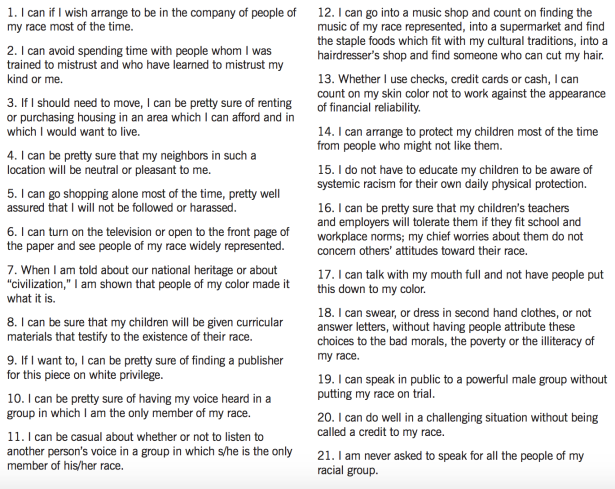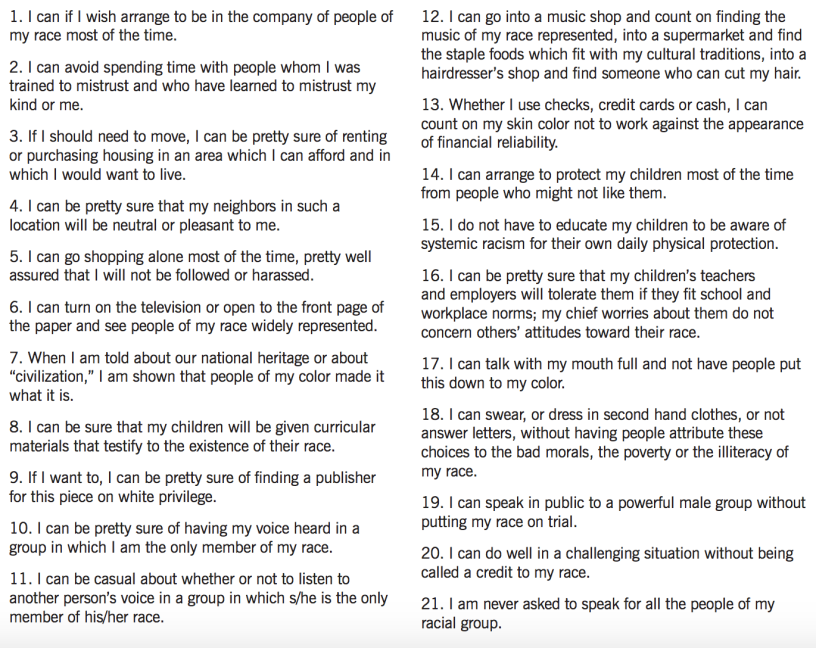White privilege is a touchy subject, especially for those white people who feel that the world has kicked them while they were down. How can we call that homeless Caucasian veteran on the sidewalk of New York in the dead of winter privileged? Does his skin color discount his daily struggles? This way of thinking can—and has—sparked conflict between people of different races who fight over what being ‘privileged’ truly means. The misunderstanding of this concept has been heightened due to the social media storm of modern-day racism in recent years. Some even argue that the term “white privilege” represents an obstacle to equality.
Luckily, the concept of ‘intersectionality’ can help sharpen the blurred edges of white privilege. Intersectionality clarifies that people may be privileged in certain ways and not privileged in others, but it is important to note that identities (gender, race, class) cannot be considered independently. For example, the aforementioned war veteran does indeed have certain privileges due to his race, while he may lack financial privileges. His skin color may not prevent poverty, but it does prove to be advantageous in other ways. These advantages and disadvantages overlap and interact together to form his landscape of opportunities.
This begs the question, what are the privileges that whiteness entails? Anti-racism activist Peggy McIntosh has formed a concept of white privilege as an “invisible knapsack,” reinforcing that certain white privileges that we carry go unacknowledged, which may lead to strife. McIntosh constructed a list of fifty advantages that are implied with whiteness. I have attached a photo of the first 21 advantages below:

Reading through this list—which ranges from mundane activities such as shopping to serious matters such as activism—opened my eyes to how many things I encounter daily that is no issue for me but very problematic for others. For example, if I were to move or travel somewhere, I would not be concerned with how my neighbors would react to me. This is not the case for my black contemporaries, many of whom feel trapped in certain neighborhoods or afraid to travel to some places. Another white privilege that I fail to appreciate is #20: “I can do well in a challenging situation without being called a credit to my race.” White people who are good at math or good at sports are commended and treated as a remarkable talent. However, throughout my years of school I have heard kids not commending their peers for achievements because “all Asians are good at math” or “black people are good at sports.” These stereotypes are an utter disservice to the work people put in as persevering individuals, and that saddens me.
In sum, white privilege does indeed exist. As a female, I may not make as much money as my male counterparts, but I have white privilege. A homeless veteran may not be able to feed himself day by day, but he has white privilege. If we recognize the existence of white privileges, perhaps bridges can be built and we will be a step closer to understanding our advantages and disadvantages as unique individuals.

My junior year of high school, my English teacher had us write an essay relating “the Invisible Knapsack” to Richard Wright’s “Black Boy”. As we discussed our essays, my teacher had the majority white class talk about instances when they had benefited from white privilege. Examples ranged from one girl’s story of getting pulled over 4 times for speeding, but managing every time to not get a ticket, to my own example of never failing to see people who looked like me in positions or careers of power. It’s difficult to understand that things we take as a given are privileges, especially when labeling them as such makes it seem like these are things we don’t deserve, when rather the truth is everyone deserves them.
I was recently discussing this concept with my dad over the phone and he said something I thought was really interesting: “people often only remember when life was unfair to them, not when they were lucky”. He works in news and at the beginning of his career he had two separate employers tell him that he could be an on-air newscaster if he changed his last name to “Gonzalez” or “Hernandez”. My dad is half Italian and has black hair and tan skin, but still looks white. These experiences have always stuck with him and were stories that I heard frequently growing up, though when he told them as a grown adult they were examples of how discriminatory the industry could be. However, as he told me recently, when he was younger, these experiences made him think that Latinos had an easier time getting jobs in news. Obviously, it is white privilege that these broadcast companies would rather hire a white person and pass them off as a person of color than actually practice inclusivity and hire a real person of color. However, I do think it is human nature to believe you have earned all that you have, especially in America where the rags to riches and self-made man narratives are so deeply ingrained in our culture. To admit that you had a head start in achieving anything is seen as admitting that you are not actually as qualified or deserving as you belief, which is a difficult pill for anyone to swallow.
LikeLike
Lots of really great meditations on white privilege in both the OP and the response here. Jaclyn, I’ve also found McIntosh’s essay to be remarkably illuminating and a great conversation piece, not only because I think it really helps white people to have sincere “ah-ha” moments about the unearned advantages they enjoy, but also because it invites readers to practice empathy; it invites white people to imagine what the inverse experience would be like, to imagine what it feels like to be called on in a classroom and asked to speak for all Black people or to give a speech and know that you were representing all Black people to many of the white audience members. These kinds of experiences have accumulating psychological and health effects.
And Carolina, I’m actually teaching Native Son in another course this semester, and I can stop thinking about how well it would have taught in our own class!
LikeLike